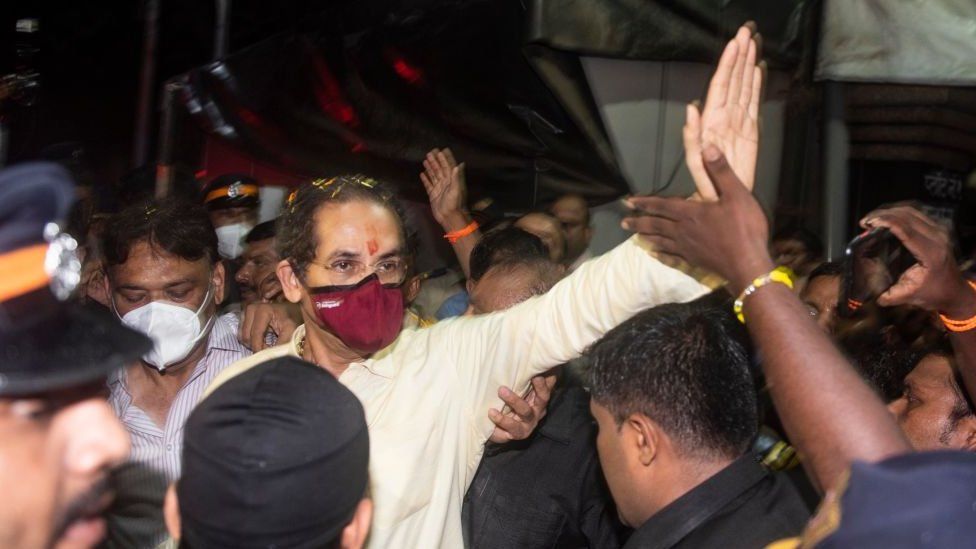Maharashtra: The political crisis brewing in India's richest state
- Published

India's richest state, Maharashtra, is witnessing high political drama that has put the fate of its government in jeopardy.
Around 35 lawmakers - led by an influential state minister, Eknath Shinde - are holed up in a hotel in Guwahati city in the north-eastern state of Assam, thousands of kilometres away from Maharashtra.
They belong to the Shiv Sena party, which is currently governing Maharashtra as part of a coalition with the Congress party and the regional Nationalist Congress Party (NCP).
Mr Shinde - who has been part of the Shiv Sena for decades - claims that he is acting in the interests of his party. But his rebellion has brought the state's government to the brink of collapse.
On Wednesday night, chief minister Uddhav Thackeray - who also heads the Shiv Sena - left his official residence after delivering an emotional speech urging the rebel lawmakers to return and speak to him.
Why the rebellion matters?
Maharashtra is one of India's largest states and politically crucial for all national parties - it is home to India's financial capital Mumbai, film industry Bollywood and some of the country's largest industries.
Developments in the state often have a direct impact on national politics.
Since 2019, it has been governed by an unusual coalition comprising the stridently right-wing Shiv Sena, the centrist NCP and the Congress, along with independent lawmakers.
Together, they managed to cobble together enough numbers to cross the halfway mark of 144 lawmakers in the 288-member assembly, thwarting India's governing Bharatiya Janata Party (BJP), which had won the largest number of seats.
The alliance took shape after the Shiv Sena split with the BJP, its long-time partner, following differences over power sharing. Despite sharing a similar ideology, the two Hindu nationalist parties had an uneasy relationship in the years leading up to the split.
The Shiv Sena began as an ethnic, nativist party to support the interests of Mumbai's Marathi-speaking people. After the erosion of its original vote bank, it positioned itself as a party which represented Hindu interests, and its base has been traditionally anti-Congress.
So its alliance with the Congress had raised a number of eyebrows and brought forth predictions of political doom. But Mr Thackeray and his allies had managed to weather several crises - until now.
Reports say that Mr Shinde is interested in reviving the alliance with BJP, bringing it back to power in the state. If he draws support from more Shiv Sena lawmakers, the current coalition government would lose its majority.
How did it start?
The crisis began after Mr Shinde became "unreachable" after Monday's legislative council elections in the state.
The Shiv Sena and its allies were predicted to win six of the 10 seats, but they got only five. The BJP, which was expected to win only four, won the other five, amid reports of cross-voting by Sena rebels.
Media reports then said that Mr Shinde, accompanied by 11 other Sena lawmakers, had left for Surat city in the western state of Gujarat - where a BJP government is in power.
Mr Thackeray responded by removing Mr Shinde as party whip.
Mr Shinde then dropped the Shiv Sena from his Twitter profile and was seen meeting BJP leaders who later visited him at his hotel in Gujarat.
What is happening now?
Mr Shinde and his supporters flew to Guwahati city in Assam - which is also ruled by the BJP - on Tuesday night, shortly after a phone conversation with Mr Thackeray.
The Indian Express newspaper quoted unnamed sources who said that the group was moved to Assam partly because Gujarat was "too close to Maharashtra" - raising the risks of disgruntled lawmakers returning to Mr Thackeray.
One lawmaker who returned to Maharashtra on Wednesday alleged that he was forcibly taken to Surat and admitted to a hospital when he tried to protest. Another said he was "misled" by Mr Shinde's supporters and was taken to Gujarat under false pretences - and that he managed to escape.
To avoid disqualification under India's anti-defection law, Mr Shinde needs the support of 37 lawmakers in the state. He has claimed the support of 40 Sena lawmakers and six independents, but the number is yet to be independently verified.
Mr Shinde has claimed he is not breaking away from the Shiv Sena and that the lawmakers will carry forward the Hindu nationalist legacy of the party's founder Balasaheb Thackeray - the chief minister's late father.
Senior Shiv Sena leader Sanjay Raut has blamed the BJP for the revolt within his party, accusing it of trying to topple the coalition government.
But senior BJP leaders have denied this, saying the crisis was Shiv Sena's "internal matter".
On Wednesday night, hundreds of Shiv Sena supporters stood in the rain at night to pledge their support to Mr Thackeray as he travelled to his home - some even sobbing as he greeted them - turning his journey into a "show of strength", reports said.
But it remains to be seen if this - and other negotiations - will be enough to coax enough lawmakers to return to the party's fold and prop up the crisis-hit government.
More from the BBC on India:
Related Topics
- Published14 November 2019
- Published26 November 2019